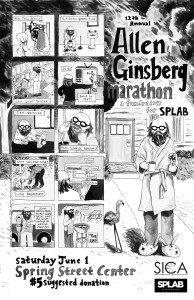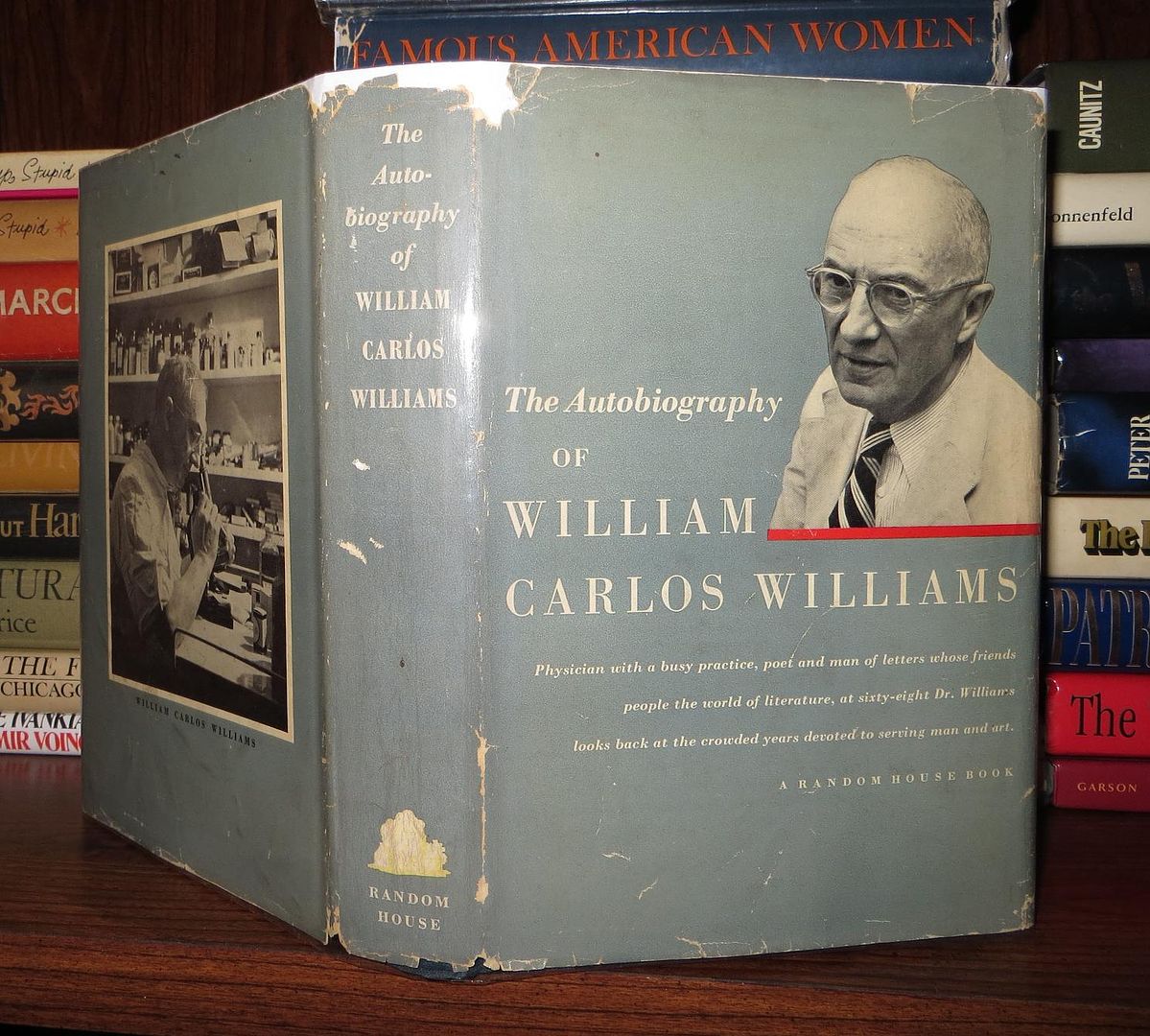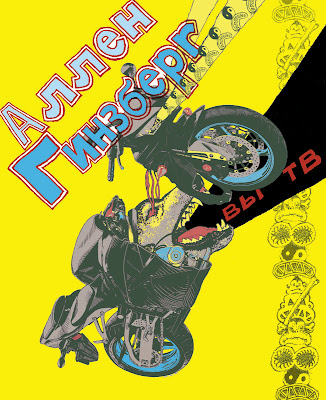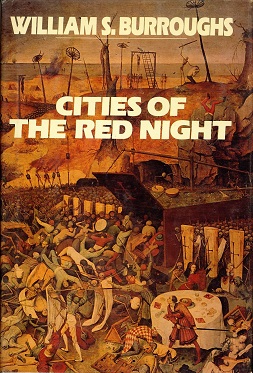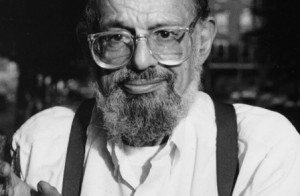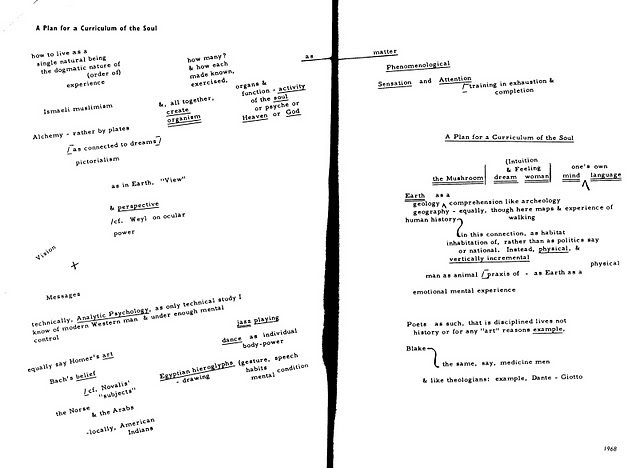
[A Plan For A Curriculum of The Soul - Charles Olson, first published in Magazine of Further Studies #5, edited by Jack Clarke, Buffalo, 1968)]
Student: Is it also a good idea, when you're doing this kind of topography with a tape-machine, or whatever, to...
AG: When you're doing this kind of topography with a tape-machine, or on the page directly, or with a tape-machine..
Student: Yeah
AG: For a tape-machine notation in this form, the biggest example I have in my own writing is "Wichita Vortex Sutra"
Student: Is it a good idea to.. put forced space, or space, between the thoughts, to isolate them as thoughts, where, (here) in the second paragraph, you start at the margin...
AG: Because it was a new thought. (So) I started at the margin.
Student: ..and there's.. Would it be a good idea to...
AG: Or a new series of thoughts, like, or a new chain of thoughts - Yeah?
Student: ...Would it, is it a good idea to make it more of an isolated thing by spacing it (that line) from the one above it?
AG: If you want to isolate it. But if it's just a new thought following an older thought, then you don't need to make a big jump. If it's a hiatus between thoughts and a definite gap, and maybe even a change of direction, or a rest (as in music), then, naturally, you want two typrwriter-, or three typewriter-, spaces - or five! (Jack) Kerouachas used a number (of), like, giant spaces, when his mind gave out and he had nothing to say - So he just dropped it (all) to the bottom. [Allen quotes Kerouac here, from "Mexico City Blues"]
"Brown wrote a book called/The White and the Black" - space, space - "N a r c o t i c C i t y/ switchin' on" - space, space - "A n g e r F a l l s --" - and then, half (of) the page, space - "(musician stops,/brooding on bandstand)" (that last phrase there) in parentheses.
So it depends on how you're scoring it, intelligibly, to indicate your own mind process. There's no point over-exaggerating the spaces between thoughts. Going back to the margin is already separating out the thoughts, separating out the sequences of thought into their pulsation beginnings.
Student: But it is a real useful device to.. use those.
AG: Yeah, sure.. The whole page is there to be used.
Now, in arranging a broken-block page, called a broken-block page, like this, you have to make the arrangements with all the other elements we've talked about. You have the syllables, the echo of syllabic count comes in in how you arrange your lines, there's echo of accent, echo of vowels, there's breath-stop to indicate breaks, there are units of mouth-phrasing, a good deal of artistic working with the balance of the page to get it looking nice and interesting and at the same time ragged like thought, having thought, then, at the very right-hand margin. Sometimes if you've really got a thought that goes on a long time and wants to have a definite end, you can bring it all the way out to the end.
These are obvious things, but, obvious as they are, very many people don't pay attention to them. Lacking the experience of writing, since they only write one poem a week, or one poem a year, you're (they're) hung-up on it. It never occurs to them that you can finally build up a practice of arrangement on the page (which, as I keep referring to, includes "chance" as an element - either chance from the point of view of an odd balloon popped up in the mind, or, I meant to say "arbitrary", but I said "arbitruck", so you have "arbitruck" there ( - and you might want to say "ARBITRUCK" in big bold letters). So that's chance - or you might not have noticed where you put the phrase down on the page anyway, or you might have just run out of space and put it up on the margin, written the wrong way, so you've got to find a place to put it later on - or you might want to put it up on the margin (just because it occurred that way, as a marginal thought)..Some(times) (Charles) Olson has done that. Olson has pages (and so has (William Carlos) Williams) where the lines are running criss-cross on the page, or crazy on the page. They're not running left-to-right. In fact, Williams always mentioned (and he told me directly) "Why is everybody putting everything on the margin all the time? It's boring. Why do all the thoughts have to be lined up, as if like soldiers in review?" In fact, he wrote a little poem about that, that ends "Peggy has a little (bit of) albumen/in hers''- I've forgotten - "This Florida", I think it was (called) ["This Florida, 1924"] "Houses rhyming up and down the street like bad poems", I think. ["But I am sick of rime -/The whole damned town/ is riming up one street/and down another.." (are the correct lines)]. He objected to the notion that everything had to begin at the margin. And, actually, if you're beginning a poem in the middle of a thought, there's no reason to begin at the margin. For instance, I began one of the poems in (my book, Kaddish), "Laughing Gas". I was waking up out of a laughing gas stupor, with the eye opening, so I just started in the middle of the page - ".......with the eye opening"..."with the eye opening/ to see a doctor and a nurse..." [ the actual lines (it's the opening of the second section of "Laughing Gas") read ".......with eye opening/slowly to perceive/that I be coming out/of a trance -/one look at the lipstick/it's a nurse/in a dentist's office"] - So I started on the right-hand side of the page [Allen begins writing on the blackboard] - like, dot-dot-dot, "with eye opening". It was on one line, but.. let me do it that way..it just started there, and then continued, over at my margin, "...to see the dentist drill" . So, ".......with eye opening", given that situation, given that being the meaning of the poem, or, given that that was the content....




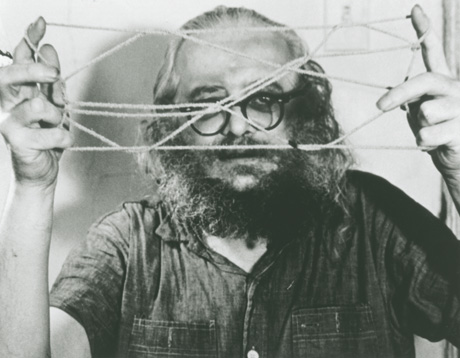





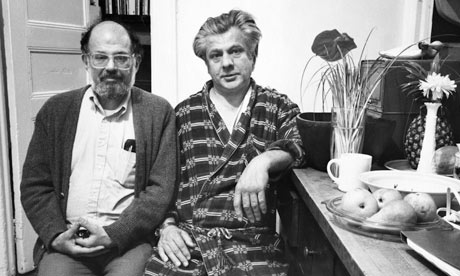 `
`


